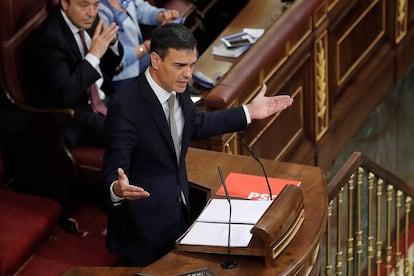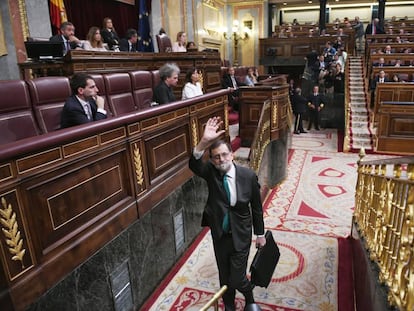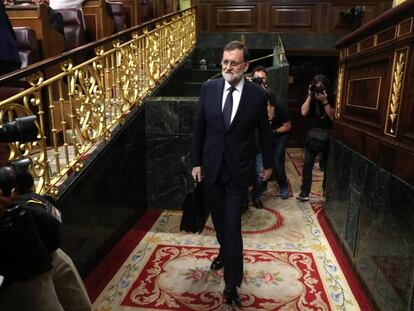An impossible government
The no-confidence vote will remove Mariano Rajoy as prime minister, but won¡¯t produce greater political stability

The resistance of Spanish Prime Minister Mariano Rajoy to quit ¨C there is still time, and we emphatically call on him to assume his responsibility and do so? ¨C has left Congress trapped between two phases and with requirements that are very different to reconcile.
On the one hand, an unquestionable ethical imperative obliges the removal of the prime minister from his position ¨C it was fitting that Rajoy¡¯s farewell should have been marked by his absence during the second part of the no-confidence motion debate on Thursday afternoon. It is time for dignity to be returned to Spain¡¯s politics and democratic institutions, far from the generalized corruption of the Popular Party.
If Congress is successful with its motion of no confidence, the time for ethical urgency should give way to the normal pace of politics under another government
On the other hand, if Congress is successful with its motion of no confidence against the government, the time for ethical urgency should give way to the normal pace of politics under another government, which should count on a program and the kind of parliamentary support that provides political and economic stability at a particularly delicate time. Unfortunately, this will not be the situation.
As was clear on Thursday in Congress, neither the prime minister nor the government can continue. But nor does the leader of the opposition, Pedro S¨¢nchez of the Socialist Party (PSOE), have the political capital to lead a stable and coherent executive. The governability of Spain is just about to pass from the hands of a leader, Mariano Rajoy, who is to blame for this institutional crisis due to his inability to deal with his political responsibility, to those of another leader, Pedro S¨¢nchez, who is refusing to turn to voters to obtain a clear mandate to move forward.
With their refusal to call an election to resolve this serious crisis, the leaders of the two parties that have governed during Spain¡¯s democratic period are showing that they do not have the confidence in themselves nor in their voters to renew the support that they were granted in other times. The refusal of one of the politicians to resign after having lost his majority, and of the other to go to the polls in order to seek a stable majority, has become an additional element in the crisis of the democratic system in which Spanish politics has found itself since 2015. In doing so, both of them are trying to avoid being punished at the polls, although it¡¯s worth asking whether in the long term this approach will do more harm than good ¨C this is most likely.
Proof of the artificial and impractical nature of a possible S¨¢nchez government is the program that he presented on Thursday in Congress
The reality is that we are watching a duel between two politicians without a future; the last gasp, perhaps, of two party leaders who are desperately clinging on to one another as the currents drag them along. Both appeared to be calculating whether it is better or worse to hang on for a few months as prime minister to be able to run in the next elections in the best possible position. But our understanding is that it doesn¡¯t matter who is in charge: both are sailing the vessel to a disastrous destination. At no time during the S¨¢nchez-Rajoy duel was even the slightest concern for the interests of Spanish citizens there to see.
We fear that the already very serious crisis will get even worse should S¨¢nchez manage to achieve his ambitions to get into government with the meager support of his 84 deputies in Congress, who? have only exceptionally managed to drum up an absolute majority for today¡¯s vote. Governing a country that is facing political, economic, social and territorial challenges with such scant support will, without a doubt, generate further instability, and will contribute further to the deterioration of trust in Spain¡¯s institutions.
Even more worrying is the desire expressed by S¨¢nchez to ¡°build bridges¡± and enter into ¡°dialogue¡± with the pro-Catalan independence forces
Proof of the artificial and impractical nature of a possible S¨¢nchez government is the program that he presented on Thursday in Congress, including the intention to govern with the budget plan recently approved by the PP, the party that he is hoping to oust. This is the very same budget that was subject to an amendment by the Socialists, who felt it was antisocial and regressive. Or consider his desire to take forward a key legislative agenda in terms of economic and social issues from a multi-colored government that, with just 84 PSOE deputies, only has the guaranteed support of 24% of the seats in Congress.
Even more worrying is the desire expressed by S¨¢nchez to ¡°build bridges¡± and enter into ¡°dialogue¡± with the pro-independence forces in Catalonia, when it is known that this dialogue would only consist of when and how a referendum on independence for Catalonia would be held. It must be pointed out that the pro-Constitution bloc formed by the PP, the PSOE and Ciudadanos that managed the response to the Catalan crisis with the application of Article 155 had the support of 254 deputies ¨C 72% of Congress.
Trying to govern without support, or, even worse, with support that is counterproductive, is imprudent
With its 84 seats, the PSOE will be the minority within its coalition of 180 deputies with whom it is planning to govern, given that all the other supporting parties (Unidos Podemos, Bildu, ERC, PDeCAT and PNV) are in favor, in one form or another, of the right to decide ¨C a euphemism for a right to self-determination that does not fit within Spain¡¯s Constitution. Can S¨¢nchez aspire to manage the Catalan crisis from a minority position within his own parliamentary coalition, while a minority within the pro-Constitution bloc itself? It will be difficult.
Ousting Rajoy, we insist, is imperative. Trying to govern without support, or, even worse, with the kind of support that is counterproductive, is imprudent. As we have said, for the sake of avoiding the instability and discrediting of the democratic system, we are asking for the swift calling of elections, on a date agreed by all parliamentary groups who want to guarantee stability and governability and who think that the most efficient and democratic solution is to give a voice to the people.
English version by Simon Hunter.
Tu suscripci¨®n se est¨¢ usando en otro dispositivo
?Quieres a?adir otro usuario a tu suscripci¨®n?
Si contin¨²as leyendo en este dispositivo, no se podr¨¢ leer en el otro.
FlechaTu suscripci¨®n se est¨¢ usando en otro dispositivo y solo puedes acceder a EL PA?S desde un dispositivo a la vez.
Si quieres compartir tu cuenta, cambia tu suscripci¨®n a la modalidad Premium, as¨ª podr¨¢s a?adir otro usuario. Cada uno acceder¨¢ con su propia cuenta de email, lo que os permitir¨¢ personalizar vuestra experiencia en EL PA?S.
?Tienes una suscripci¨®n de empresa? Accede aqu¨ª para contratar m¨¢s cuentas.
En el caso de no saber qui¨¦n est¨¢ usando tu cuenta, te recomendamos cambiar tu contrase?a aqu¨ª.
Si decides continuar compartiendo tu cuenta, este mensaje se mostrar¨¢ en tu dispositivo y en el de la otra persona que est¨¢ usando tu cuenta de forma indefinida, afectando a tu experiencia de lectura. Puedes consultar aqu¨ª los t¨¦rminos y condiciones de la suscripci¨®n digital.










































